On the morning of September 30th a strike on an apartment in a neighbourhood in Beirut received no small amount of coverage on the BBC News website’s live page.
Notably, the BBC chose to describe the PFLP terrorist organisation as a “Palestinian militant group”, a “left-wing Palestinian armed group” and a “resistance movement”, with only one of the entries clarifying that it is designated as a terrorist organisation by Israel and the US but failing to note that it is also defined as such by Canada, Japan and the European Union.
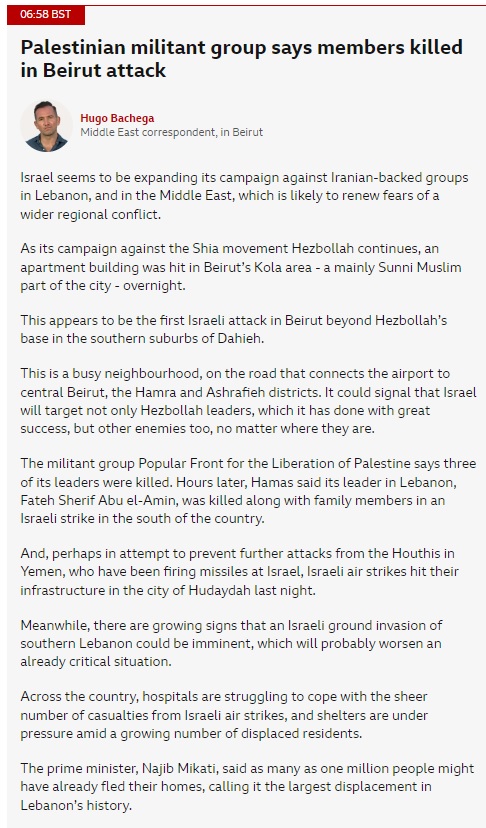
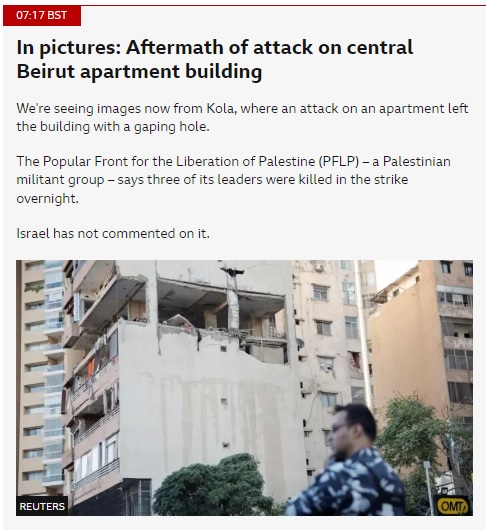
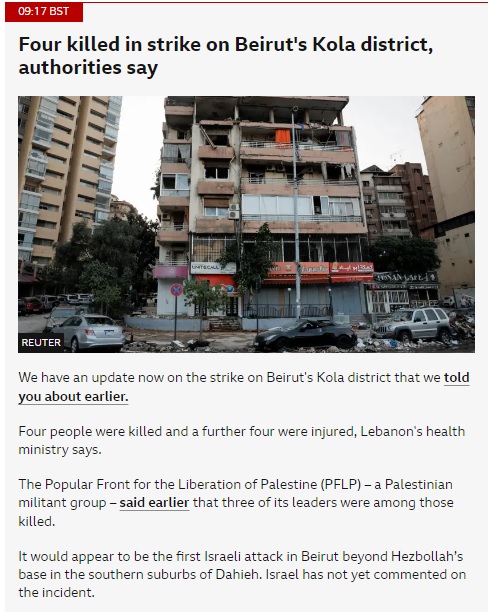
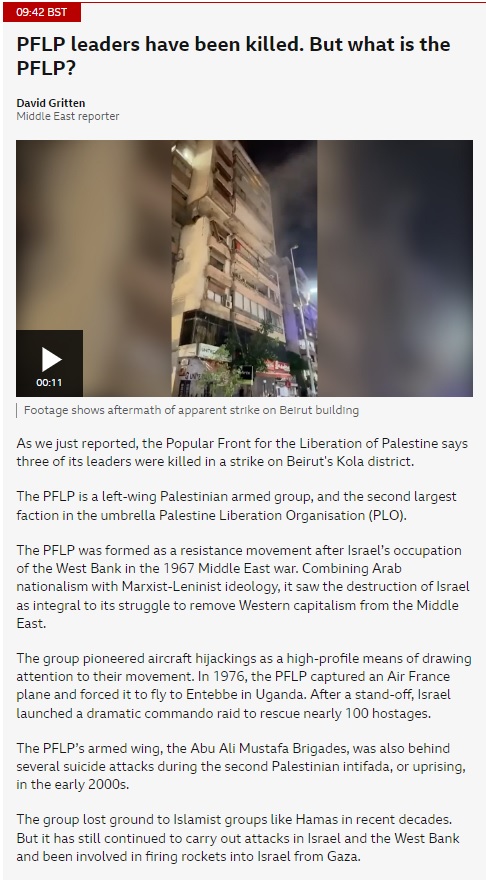
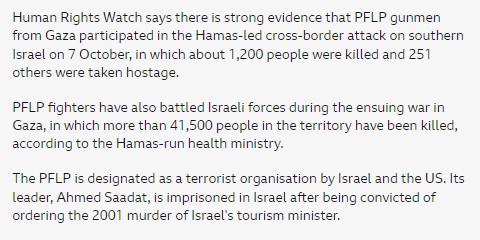
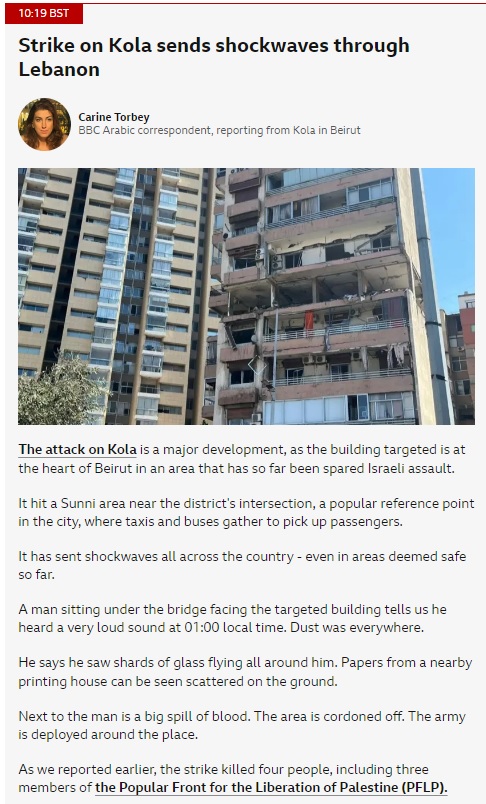
A report which appeared on the BBC News website on the evening of September 30th under the original headline “Israel tells US it plans to launch limited ground incursion into Lebanon” told BBC audiences that:
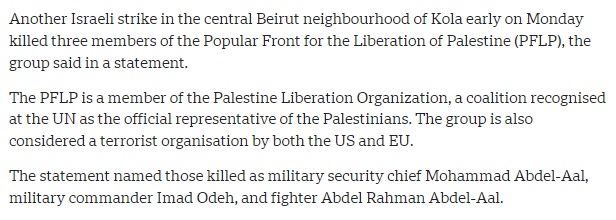
That report was subsequently retitled “Israel launches ‘ground raids’ against Hezbollah” and is credited to George Wright and Mallory Moench. Notably, the version currently appearing online excludes the previously provided information concerning the PFLP’s membership in the PLO and some of the PFLP’s designations: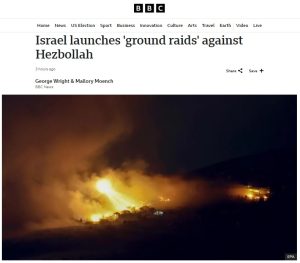
“Another Israeli strike in the central Beirut neighbourhood of Kola early on Monday killed three members of the Popular Front for the Liberation of Palestine (PFLP), the Palestinian armed group said in a statement.
The statement named those killed as military security chief Mohammad Abdel-Aal, military commander Imad Odeh, and fighter Abdel Rahman Abdel-Aal.”
The BBC’s reports do not inform audiences that, as reported by the Times of Israel and others:
“According to the military and Shin Bet, Nidal Abd al-Aal was involved in planning and advancing terror attacks in the West Bank.
The IDF and Shin Bet say al-Aal was behind a bombing attack on a bus in the settlement of Beitar Illit in March 2023, as well as a shooting attack in Huwara in the same month, the latter of which wounded two soldiers.
Alongside him, Imad Odeh, a PFLP military commander, and another operative, Abdelrahman Abd al-Aal, were killed in the strike.”
As readers may recall, that attack on a bus in Beitar Illit did not receive any coverage on the BBC News website at the time and the shooting attack in Huwara was reported in just one sentence in a BBC article on another topic.
That same September 30th live page also included entries relating to a strike elsewhere in Lebanon in which Hamas was described as a “militant group”, despite the BBC having stated that it would cease to use that term back in October 2023.
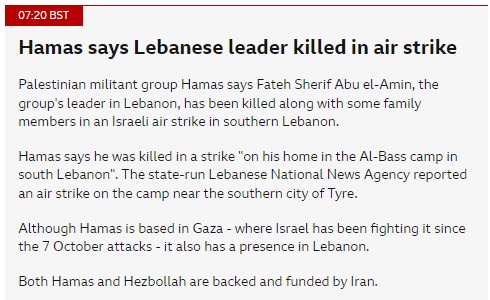
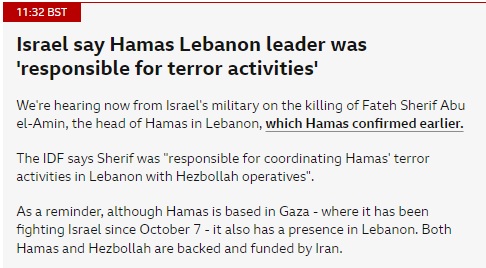
Later in the day, two more entries concerning that story were published:
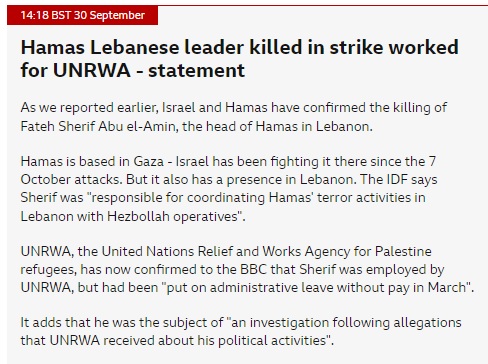
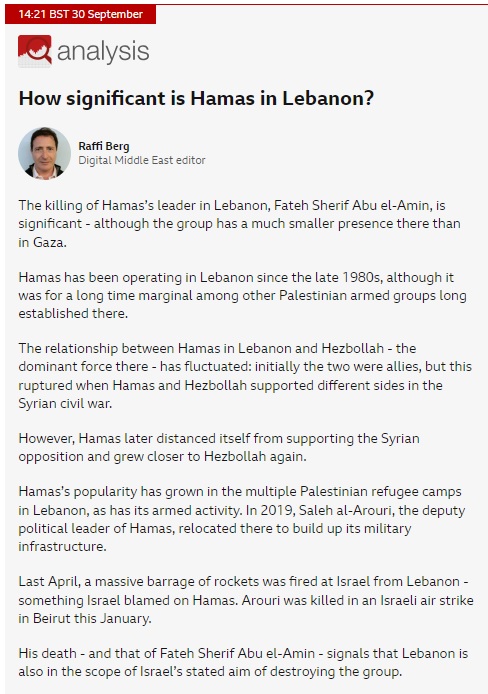
Both the original and current versions of Wright and Moench’s above mentioned report tell BBC audiences that:
“Meanwhile, Israel and Hamas have both confirmed the killing of the head of Hamas in Lebanon, Fateh Sherif Abu el-Amin, in Israeli strikes in southern Lebanon.
Israel’s military said Sherif was “responsible for co-ordinating Hamas’s terror activities in Lebanon with Hezbollah operatives”.”
In other words, the fact that the head of the Hamas terrorist organisation’s Lebanon branch was also a UN employee received just 53 words of BBC News website coverage and the reports failed to clarify that he was actually the head of the UNRWA teachers’ union in Lebanon.
Notably, the BBC avoided the highly relevant question of whether or not Fateh Sherif Abu el-Amin’s suspension was still in force. As reported by UN Watch in June 2024:
“Despite UNRWA knowing for more than a decade that the head of its teachers union in Lebanon, Fathi al-Sharif (a.k.a. Fateh “Abo Amin” al-Sharif), overseeing 39,000 students in 65 schools, is part of Hamas and an overt promoter of terrorism, the agency is refusing to fire him. […]
While UNRWA did suspend al-Sharif in February 2024, al-Sharif’s current status is unclear. The reports discussed below indicate that UNRWA suspended al-Sharif and asked for his resignation, but that he refused. According to the Palestinian Refugees Portal website, Lazzarini agreed to cancel the suspension in exchange for ending the UNRWA strike that was paralyzing UNRWA’s operations in Lebanon.”
Given its longstanding record of generously platforming UNRWA – particularly throughout the past year – and its amplification of that agency’s talking points on the issue of the involvement of some of its employees in terrorism, one might have expected the BBC to show considerably more interest in investigating what it tepidly describes as Sharif’s “political activities”.
As we see however, journalistic curiosity did not prevail and so once again BBC audiences – including members of the public who fund their governments’ donations to UNRWA – were sold short on the issue of UNRWA and terrorism.
Related Articles:
AN OVERVIEW OF BBC WEBSITE REPORTING ON PESSAH ROCKET ATTACKS
BBC REPORTS ON ATTACKS FROM LEBANON EXCLUDE ESSENTIAL INFORMATION
BBC PLATFORMING OF UNRWA TALKING POINTS AND ALLEGATIONS
BBC NEWS REPORTING ON SALEH AL AROURI HIGHLIGHTS YEARS OF OMISSION

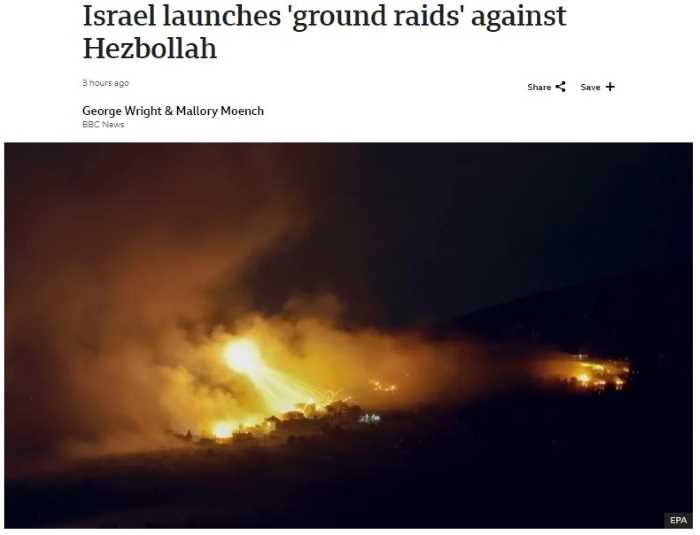


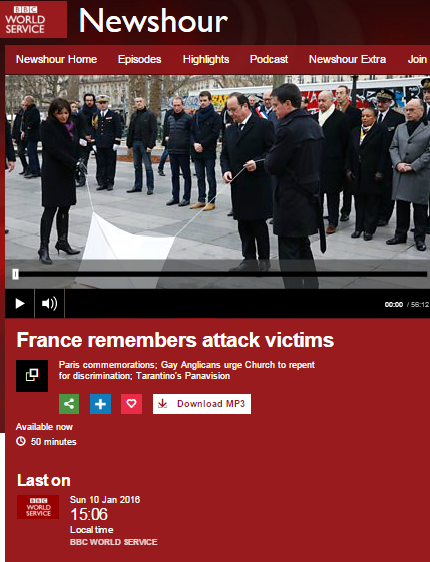

Terrorists and terrorist enablers, ‘in blood stepped in so far’.
Sorry, I meant ‘militants’ … militants who hack babies to pieces
HAMAS = UNWRA = BBC = HEZBOLLAH = AL JAZ = HOUTHIS = UN = RED CROSS
#defundthebbc
#defundunwra
#defundtheredcross